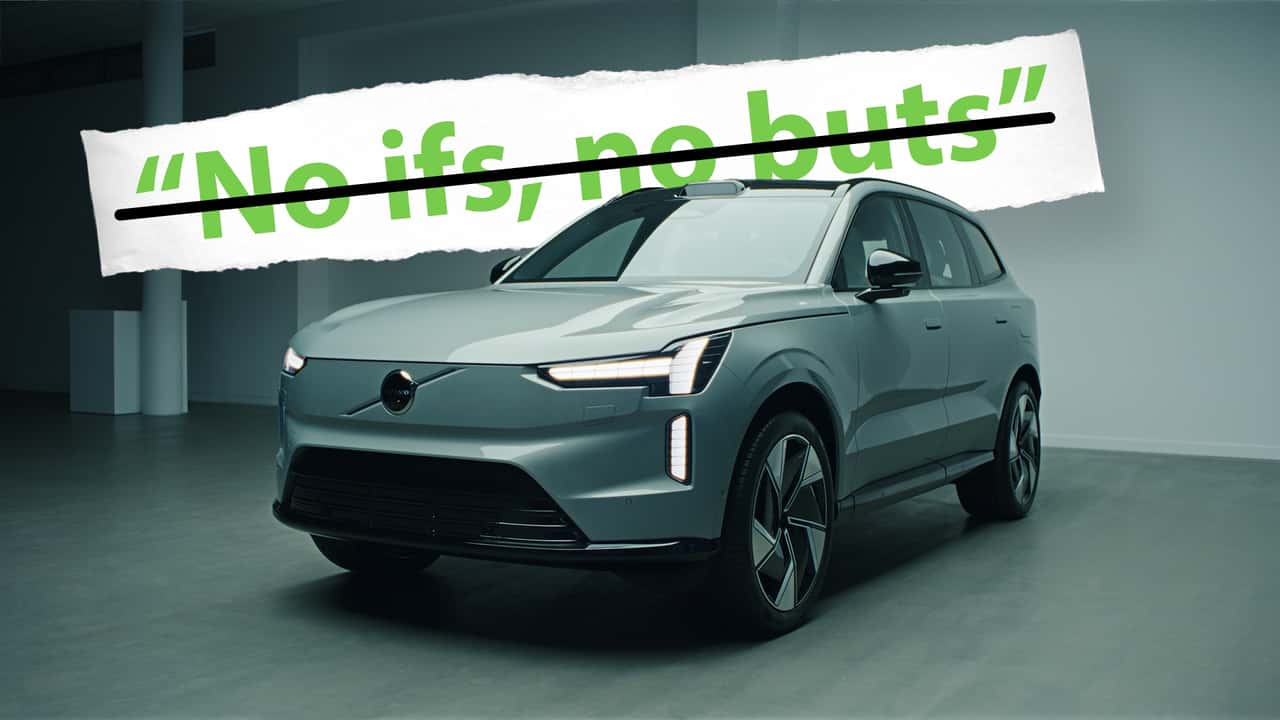Volvo’s chief commercial officer Bjorn Annwall said just last year that there were “no ifs, no buts” about selling only fully electric cars after the turn of the decade. The brand, according to Annwall, would not “sell a single car” that is not fully electric after 2030. But now, it’s finding some ifs and buts as well.
As the demand for EVs proves to be uneven globally, especially for Western brands in China and with various uncertainties in the U.S., Volvo’s leadership team has taken a step back and begun to ponder if the future is meant to be more hybrid-focused—at least in the meantime.
Get Fully Charged
Volvo’s Commitment to Electrification
In 2021, Volvo decided to join the then-very-exclusive club of automakers who planned to only sell battery-electric vehicles in the future. The automaker’s goal was ambitious: by 2030, it wouldn’t sell a single car anywhere on the planet that wasn’t powered exclusively by electricity. But now, Volvo is questioning whether or not consumers—and the global powers—are ready for their promise.
Now, let’s be clear: Volvo is still ready to aim high with its goal of electrification. However, the rest of the world might not be ready. Infrastructure is still playing catch-up in some places, governments are feuding over the location of component sourcing and assembly, and the future of subsidies remains a mystery. And Volvo has already taken a hit to its electric plans with the EX30 getting delayed in the U.S. over anti-China tariffs.
Luckily for Volvo, it has long had a strong hybrid and plug-in hybrid game, so if there’s more interest there in the near-term it’s well-positioned to give customers what they want. Here’s what Volvo’s CEO had to say in a recent webcast, according to Automotive News:
During a quarterly investor webcast, Volvo CEO Jim Rowan said he’s a “huge believer in electrical propulsion,” which he called a better technology than the internal combustion engine.
But Rowan acknowledged it will “take time to bridge different parts of the world for full electrification.”
Hybrids “form a solid bridge for our customers that are not ready to move to full electrification,” he said July 18. “Our plug-in hybrids and mild hybrids remain very strong and popular with our customers, and we will continue to invest in this lineup.”
Adding to the uncertainty of Volvo’s all-EV future is slumped EV sales in key markets like the U.S. and China. The automaker is now reportedly reconsidering whether or not its original promise of electrifying its entire lineup globally by 2030 is really sustainable, or if it needs to go back to the drawing board and decide whether or not the world is ready.
Even if Volvo can’t justify an EV-only lineup, the automaker still believes that battery propulsion tech is the way forward. If it can’t do battery-only, perhaps Volvo will move forward with hybrid powertrains instead, which is a win in the eyes of some dealerships.
Volvo dealers have reportedly cast a similar doubt on the brand’s fully electric direction as well. According to Automotive News, some dealerships say that they expect to sell gas-powered hybrids past the turn of the decade despite what brand executives have been promising over the past three years. “We will have to, or we will die,” said one dealer when speaking to Automotive News. “Volvo has gotten way out over their skis with this EV-only strategy.”
Another person familiar with Volvo’s future plans says that the automaker expects to hone in on hybrids over the next decade. Once the EV markets across the world—including the U.S. market—matures, revisiting the BEV-or-bust strategy may be back in the cards.
In the ever-evolving landscape of the automotive industry, Volvo has recently announced a shift in its focus regarding electric vehicles. Originally, the Swedish automaker had made a bold promise to go all-electric by 2030. However, in a surprising turn of events, Volvo has decided to back off from this commitment and will likely push hybrids instead.
This decision comes as a slight deviation from Volvo’s long-standing commitment to sustainability and environmental preservation. The company’s initial pledge to transition to a fully electric lineup by the end of the decade was seen as a significant step towards reducing carbon emissions and combating climate change. However, Volvo’s recent statement indicates a more pragmatic approach to achieving these goals.
According to Volvo CEO Hakan Samuelsson, the shift towards hybrids is a strategic decision aimed at meeting the diverse needs of consumers while also ensuring a smooth transition towards electrification. Samuelsson highlighted the challenges of infrastructure, range anxiety, and cost as key factors that influenced Volvo’s decision to focus on hybrid vehicles in the near term.
While some may view Volvo’s decision as a step back from its commitment to sustainability, the company maintains that hybrids can play a crucial role in reducing emissions and promoting electrification. By offering a mix of hybrid and electric vehicles in its lineup, Volvo aims to cater to a broader range of consumers, including those who may be hesitant to fully embrace electric vehicles.
Despite this change in direction, Volvo remains committed to its long-term goal of achieving a fully electric lineup. The company has pledged to continue investing in electric vehicle technology and expanding its range of electric models in the coming years. Volvo’s decision to prioritize hybrids in the interim should not be seen as a reversal of its commitment to sustainability, but rather as a pragmatic approach to meeting the evolving needs of consumers.
In conclusion, Volvo’s decision to back off from its EV-only promise and focus on hybrids instead represents a strategic shift in the company’s electrification strategy. While the move may come as a surprise to some, Volvo’s commitment to sustainability remains unwavering. By offering a mix of hybrid and electric vehicles, Volvo seeks to meet the diverse needs of consumers and pave the way towards a greener, more sustainable future in the automotive industry.

